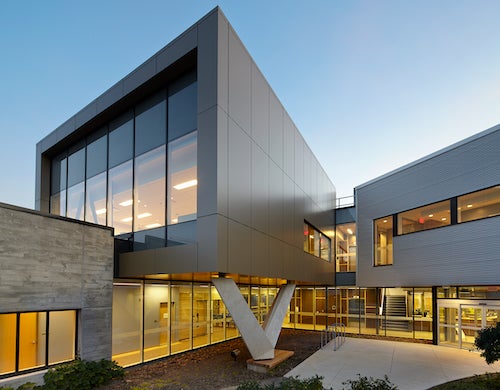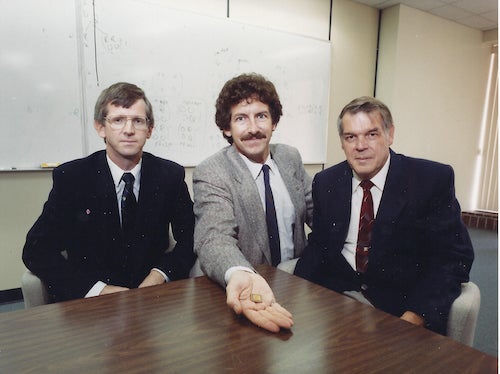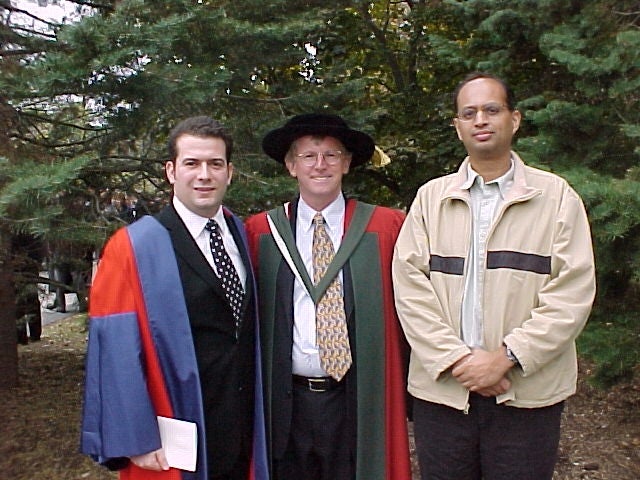Editor:
Brandon Sweet
University Communications
bulletin@uwaterloo.ca
COVID-19 testing centre to open on campus

The University of Waterloo is opening its own on-campus COVID-19 assessment and testing centre,in collaboration with St. Mary’s General Hospital, Ontario Health West, and Region of Waterloo Public Health.
"In addition to the new Campus Check-In tool announced last week, the testing centre is one of the latest measures we are taking to protect the health and safety of our University community as we gradually resume campus activities," wrote President Feridun Hamdullahpur in a memo circulated to employees today. "This initiative, led by Campus Wellness, is an important piece of our community’s response to the pandemic."
"Having testing available on campus will help with quickly responding to any positive cases of COVID-19 and aid efforts to contain the spread," Hamdullahpur writes. "Students or employees showing symptoms or who suspect that they have been exposed to the virus can get tested at a convenient on-campus location and receive the immediate medical guidance they need. This will also quickly facilitate any necessary contact tracing through RWPH or Occupational Health and Campus Wellness, where appropriate."
The on-campus assessment and testing centre will also help to lighten the load carried by other testing facilities in Waterloo Region.
How can employees and students access the testing centre?
The assessment and testing centre is scheduled to open on October 1 and will be located in the Health Services building, with plans to open additional locations on campus in the near future. For the health and safety of our campus community, it will only be open to students and employees of the University. A medical referral is not necessary to get tested, but students and employees will need to make an appointment through Health Services.
What to do if you are ill
If you test positive for the virus or have been in close contact with someone who has tested positive for the virus, contact Occupational Health. Occupational Health will guide you through the next steps. Students who test positive should contact Health Services.
Disclosures of COVID-19
If someone tells you that they believe they have COVID-19, refer to the updated protocol for individual disclosures of COVID-19.
Health and safety reminders
"We all have an important part to play in limiting the spread of COVID-19," Hamdullahpur writes. "Please remember to follow public health guidelines and the University’s health and safety recommendations."
If you are coming to campus, be sure to:
- Review the Welcome Back Waterloo guide.
- Check in by connecting to the eduroam Wi-Fi network or by completing the Campus Check-in form every day you visit campus and for every building you visit.
- Complete the COVID-19 self-assessment each day before you arrive on campus.
- Wear a face covering in common indoor areas.
- Wash or sanitize your hands frequently.
"As we head into fall term, we must continue to look out for one another and each do our part to keep our campus community safe," the president's memo concludes.
The profound impact of a researcher

From left to right: Scott Vanstone, Gord Agnew and distinguished professor emeritus Ron Mullin.
This article originally appeared on Waterloo Stories.
In 1972, Scott Vanstone (BMath '70, MMath '71, PhD '74) walked into Ron Mullin’s (MA '60, PhD '64) office and told him he wanted to be his student. Originally, Scott started studying chemistry at the University of Waterloo, but switched to math.
According to Ron, “Scott had no choice but to become a mathematician … he said that he found out that math is more fun than hockey.” Ron, supervised by the now famous cryptographer William Tutte and the first student to graduate from Waterloo in 1964, was quickly convinced to take Scott as a student. The two became colleagues, co-founders and friends and their profound impact on the Waterloo and global cryptography community lives on today.
Monday, September 14 would have been Scott’s 73rd birthday. Since losing Scott to cancer in 2014, his wife Sherry Shannon-Vanstone has wanted to document and recognize Scott’s impact and has done so by recognizing September 14 as Profound Impact Day. Marking this inaugural occasion, Sherry’s friends, family and the Faculty of Mathematics have launched the Waterloo Math Digital Community, an online portal allowing users to trace Scott’s academic ancestry, math students (past and present) and see their connections to Scott and other researchers. The platform helps students, researchers and alumni network and engage with each other, displaying the collective impact the Faculty of Mathematics story has to tell.
As the academic grandson of Tutte and academic son of Ron, Scott comes from a strong pedigree. And he’s inspired many notable students since.

Alfred Menezes (right) and Michele Mosca (left) were inspired by Scott (middle) while still in high school and chose to study mathematics at Waterloo after meeting him. The two alumni who became professors at Waterloo also focused on cryptography.
As he became a professor himself, his research covered combinatorial design theory, finite geometry and finite fields. In the 1980s, Scott focused on cryptography. He saw potential — not just in the mathematics of elliptic curve cryptography (ECC), but in talent. Alfred Menezes and Michele Mosca were inspired by Scott while still in high school and chose to study mathematics at Waterloo after meeting him.
The two alumni who became professors at Waterloo also focused on cryptography. Alfred became the managing director of the Centre for Applied Cryptographic Research and Michele was one of the earliest researchers at the Institute for Quantum Computing, and now has two startups, evolutionQ and softwareQ.
“Scott was driven by curiosity, had raw talent working with very difficult mathematics, full of energy, and wanted to have a positive impact on the world,” Michele remembers. “He always looked ahead with a broad view.”
Scott’s own research led to the implementation of ECC, a concept introduced in 1985. The secure and efficient methods for confidentiality and authentication of machine-to-machine communication was a practical breakthrough in cryptography. Along with Ron and Gord Agnew from the Department of Electrical and Computer Engineering, Scott founded Certicom.
Scott could take a very complex subject like ECC and break it down for non-technologists. He had to convince wireless companies that RSA — the commonly used public-key cryptosystem at the time — was slow and inefficient. Today, almost every wireless company uses Certicom technologies to embed the security right into its applications. The IP culture Scott created and the stream of talent he identified, including his future wife Sherry, led to the sale of Certicom to BlackBerry in 2009 which included around 450 patents, most of which were Scott’s.
Scott’s profound impact is still felt today through his books and research articles, patents, awards, family and notable students. While this is his story, Scott’s family is keen to hear the many other success stories from Waterloo’s mathematics family. Join the Waterloo Math Digital Community today and share yours.
Q and A with the experts: kids' mental health and back to school
The University of Waterloo has a number of experts available for comment on various aspects of the COVID-19 pandemic.

As many kids go back to school this week amidst uncertainty about social distancing, class schedules, and what their day-to-day life will look like, we spoke with Professor Dillon Browne – an expert in developmental psychology – to hear his thoughts about the effect this will have on their mental health.
Is going back to school in a socially distanced way going to affect the mental health of our kids? Are there differences in how kids will experience the changes based on age?
September is generally a time where kids with anxious dispositions tend to struggle. This year, it’s probably safe to say that an even greater proportion of kids will be dealing with feelings of anxiety. It’s important to note that going back to school (this year or any) should not be thought of as a “cause” of mental health problems. Rather, it might be viewed as a stressor that causes symptoms to flare up in children who are already tending in this direction. As the stressor is greater this year, it follows that a larger number of children may find themselves having impairing levels of anxiety and fear. Also, age can influence how mental health problems are displayed. For young children, we often become aware of feelings of fear or sadness through “acting out” type behaviors. In other kids, it may be more of a loss of interest in activities, low energy, irritability, or changes in sleep patterns.
Are our kids affected by how their teachers are handling back to school? Are they affected by their parent’s anxiety about back to school? How do kids deal with the mental health of the adults around them?
Children influence and are influenced by the adults in their lives. There is no question that both teachers and parents have more on their plates this year. Kids do too. Thus, there is a collective level of heightened stress that can be manifesting in these relationships and interactions. Different kids respond to distress in adults in different ways based on their dominant coping strategies. Some kids can become avoidant, suppress emotion, and make a display that “they can do it on their own”. Other kids can heighten their emotional responses in order to recruit caregiving and soothing. In both instances, kids need the message that they will be alright because the adults are alright and can take care of them. Of course, this necessitates the adults being alright, too.
How will it affect kids if they go back to school, and then the schools are shut down again due to a COVID case?
A recent simulation study, led by my colleague Chris Bauch at the University of Waterloo, demonstrated that the proposed class sizes will actually result in fewer student days of school, due to the need to close entire classes when a case of COVID comes up. The larger the class, the more kids this will affect. Given the way things look, parents should absolutely prepare for the possibility that there will be closures for their child’s class or school, and have a contingency caregiving plan in place to offset the nature of this disruption, as best they can. Unfortunately, anticipated shut-downs will likely be dysregulating for kids, especially those who need a well-oiled routine to be successful. This is why it's important for families to have these conversations ahead of time. One option is to draw on other parents in their social circle.
Dillon Browne is assistant professor of psychology (clinical) in the Psychology department at Waterloo. His research examines the influence of Adverse Childhood Experiences (ACEs), trauma, and socioeconomic status on human development.
WUSA kicks off a virtual Welcome Week
The Waterloo Undergraduate Student Association (WUSA) is welcoming new and returning undergrads to the UWaterloo campus community with a full week of diverse virtual events, including an Anti-Racism 101 Workshop on Monday, September 14 hosted by RAISE on @yourwusa Instagram Live and a Local Sounds Concert on Wednesday, September 16 on YouTube Live. Full details can be found on the WUSA website.
Upcoming office closure
Campus Wellness locations will be closed on Tuesday, September 15 from 8:30 a.m. to 11:30 a.m. due to an all-staff meeting.
Link of the day
When and Where to get support
Students can visit the Student Success Office online for supports including academic development, international student resources, leadership development, exchange and study abroad, and opportunities to get involved.
Instructors can visit the Keep Learning website to get support on adapting their teaching and learning plans for an online environment. The following workshops are current offerings from the KL team (CTE, CEL, ITMS, LIB):
Getting Ready to Facilitate Online Courses: TA Training, beginning July 13.
Remote Course Design Essentials, beginning August 26.
Independent Remote Course Design Essentials. Continuous self-enroll course in LEARN.
LEARN for TAs, Tuesday, September 15, 10:00 a.m.
LEARN for TAs, Wednesday, September 16, 2:00 p.m.
Employees can access resources to help them work remotely, including managing University records and privacy of personal information
Interested in learning more about engaging your students in an online course? The Centre for Extended Learning has created a new resource for you called "Fostering Engagement: Facilitating Online Courses in Higher Education"
ThisOpen Educational Resource was designed for post-secondary instructors and teaching assistants who would like to better understand the critical role of facilitation in online course delivery, and build practical skills and strategies that are relevant, effective, and authentic.
Here are some tips for staying healthy while working from home.
The Writing and Communication Centre is rolling out virtual services and programs for fall term:
- Undergrad students -- work with us to brainstorm, draft, revise, and polish assignments by meeting with our writing advisors in virtual appointments. Chat with our friendly and knowledgeable peer tutors in our virtual drop-ins and PJ-friendly writing groups. Or experience an online workshop at your own pace.
- First-year Warriors! Check out Waterloo Ready to Write to build your skills for writing success.
- Graduate Students -- meet with an advisor in a virtual appointments, take an online workshop, join the grad writing community at our Virtual Writing Cafés and #WaterlooWrites groups, develop your academic voice at Speak Like a Scholar, or make progress on your thesis at Dissertation Boot Camp.
- Instructors and faculty -- Request and access WCC workshops for use in your courses, join a virtual writing group, or speak with a writing advisor about a writing project.
We understand that these circumstances can be troubling, and you may need to speak with someone for emotional support. Good2Talk is a post-secondary student helpline based in Ontario, Canada that is available to all students. If you feel overwhelmed or anxious and need to talk to somebody, please contact the University’s Campus Wellness services, either Health Services or Counselling Services. You can also contact the University's Centre for Mental Health Research and Treatment.
The Library has published a resource guide on how to avoid information overload.
The Faculty Association of the University of Waterloo (FAUW) continues to advocate for its members. Check out the FAUW blog for more information.
The University of Waterloo Staff Association (UWSA) continues to advocate for its members. Check out the UWSA blog for more information.
WUSA supports for students:
Food Support Service food hampers are currently available from the Turnkey Desk on weekdays from 9:00 a.m. to 4:00 p.m. in the Student Life Centre. If you have any questions please email us at foodsupport@wusa.ca.
The Bike Centre – Now open by appointment for your bicycle repair and rental needs in the Student Life Centre. For more information or to schedule an appointment, please go to: https://wusa.ca/bikecentre
Centre for Academic Policy Support - CAPS is here to assist Waterloo undergraduates throughout their experience in navigating academic policy in the instances of filing petitions, grievances and appeals. Please contact them at caps@wusa.ca. More information at http://wusa.ca/caps
WUSA Commissioners who can help in a variety of areas that students may be experiencing during this time:
- Equity – equity@wusa.ca
- Co-op and Experiential Affairs – coop.affairs@wusa.ca
WUSA Student Legal Protection Program- Seeking legal counsel can be intimidating, especially if it’s your first time facing a legal issue. The legal assistance helpline provides quick access to legal advice in any area of law, including criminal. Just call 1-833-202-4571.
Empower Me is a confidential mental health and wellness service that connects students with qualified counsellors 24/7. They can be reached at 1-833-628-5589.
When and Where (but mostly when)
Healthy Warriors at Home. Free programming including Online Fitness, Health Webinars, Personalized Nutrition and more from Warriors Athletics and Rec. Open to students, staff, faculty and alumni. Register today.
Warrior Rec Intramurals. 8 leagues for you to choose from (6v6 indoor soccer, 7v7 soccer, beach volleyball, disc golf, spikeball, ultimate indoor, ultimate outdoor, and volleyball). Registration is open now until Monday, September 14. Sign up today!
Esports Registration. 11 different esports to choose from (League of Legends, Overwatch, Rocket League, Fifa 20, Smash Ultimate, Smash Melee, Hearthstone, Catan, NHL 20, NBA 2k20, Madden 20). Registration is open now until Monday, September 14. Sign up today!
Warrior Rec Zumba for Grad Students. Free zumba class for all grad students happening Monday, September 14, 7:00 p.m.. Email gsa-wellness@uwaterloo.ca for more information.
WUSA Welcome Week,Monday, September 14 to Friday, September 18.
NEW - CBB-[CREATE Series]-Innovations and Challenges at a time of Pandemic by Professor Alexander Wong, Tuesday, September 15, 1:00 p.m. to 2:00 pm. Online via Webex.
Portage-Global Water Futures Research Data Management webinar series: “(Some) Research Data Management Best Practices!” Wednesday, September 16, 1:00 p.m. Registration details can be found here.
NEW - University Senate meeting, Monday, September 21, online.
More Feet on the Ground Mental Health Training for Faculty and Staff, Tuesday, September 22, 9:30 a.m., Online – Register on GoSignMeUp.
Women in Math Virtual Welcome Event session 1, "What I Wish I Knew Then...", Tuesday, September 22, 12:00 p.m. to 1:00 p.m. RSVP.
Women in Math Virtual Welcome Event session 2, "What I Wish I Knew Then...", Tuesday, September 22, 8:00 p.m. to 9:00 p.m. RSVP.